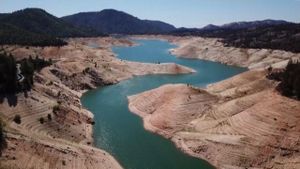President Donald Trump has stirred diplomatic waters by signing an executive order renaming the Gulf of Mexico to the Gulf of America, igniting controversy rooted in international maritime law and raising eyebrows among local and international communities.
The announcement, made on January 24, mandates all federal maps and documentation to reflect the new title emphasizing the region's economic contributions. Trump stated this name change symbolizes the United States' ambitions to reaffirm its stature on the global stage. "This is aimed at making the United States the greatest, most powerful, most respected nation on Earth," he proclaimed.
Capturing this new nomenclature aboard flights, passengers were met with surprise recently when flight crews referred to the Gulf as the Gulf of America. “This is your Captain speaking. If you look at your right side of the aircraft, you’ll see the Gulf of America,” the pilot announced, prompting laughter and social media chatter among perplexed travelers.
The Gulf of America encompasses a massive and economically significant area bordered by the U.S. southeastern coastline and parts of Mexico and Cuba. Spanning several states, including Texas, Louisiana, Mississippi, Alabama, and Florida, the Gulf has historically been known as the Gulf of Mexico. Yet, with Trump's decree, federal recognition will now align the iconic water body with the new title.
Chevron Corporation, one of the largest oil companies active within the Gulf region, quickly adapted to the new name, now referring to the waterway as the Gulf of America. Chevron CEO Mike Wirth expressed willingness to pivot with the official language change following government directives, stating, "If Google Maps is using it — then Chevron is using it," indicating the corporate alignment with governmental policies.
Yet, not all are welcoming the abrupt title change. Mexican President Claudia Sheinbaum has officially contested the U.S. government's decision, arguing it infringes on international law. Her letter to Google insisted the United States cannot unilaterally impose nomenclature over regions not wholly under its sovereignty. "Under international law, any change in the designation of a body of water can only apply within a country's territorial waters — which extend up to 12 nautical miles. The Gulf of Mexico is not entirely within U.S. territory. Therefore, the name change cannot apply to the entire body of water," Sheinbaum stated during press remarks.
Despite these international objections, Google's mapping service plans to adapt to the U.S. government's directive by relabeling the body of water as the Gulf of America. Interestingly, maps accessed from Mexico will still show the traditional Gulf of Mexico, highlighting the geographic and political fissures formed by Trump's announcement. Global users will see both names, representing the contention surrounding the name change.
While some residents might chuckle at the name change's silliness, it carries weight for globe manufacturers like Replogle, who must shift their narrative to meet political whims. Joseph Wright, CEO of Replogle, acknowledged the challenges of adapting to changing political climates: "It’s tough business climate for both our businesses, newspapers and globes, as we have to reflect political realities, regardless of their authenticity. Each publisher can decide what they wish to produce. The U.S. Board of Geographic Names under the Department of the Interior does serve as our initial reference point. But we also must heed international recognitions and understand their contexts."
This scenario creates myriad complications beyond just semantics. The renaming reflects America's assertive pursuits amid changing global dynamics. Corporate entities are compelled to adapt proactively, balancing government influence and global sentiments.
Different industries, from airlines to map manufacturers, feel the impact of this renaming; they must navigate governmental demands merging with international expectations. While the term Gulf of America may soon appear on maps, it raises bigger questions: Is the shift merely nominal or will it lead to broader economic and diplomatic ramifications?
Responsibility rests with local businesses and citizens alike, who play pivotal roles as consumers who receive products labeled with this contentious naming shift. They must determine the appropriateness of embracing the Gulf of America or maintaining ties to the Gulf of Mexico. Striking this balance will serve to mirror the charge of respecting regional heritage against the backdrop of nationalistic ambition.
It remains to be seen how the eventual transition plays out both on the ground and across global maps. Though some may trivialize the matter, it encapsulates America’s fractured relations with neighbors and captures the essence of globalization's many complications.
While the State will have its say and corporations adapt, can public sentiment be easily swayed? The Gulf of America is set to become more than just words — it could redefine maritime and diplomatic relations, echoing long after one administration's declarations fade from memory.



